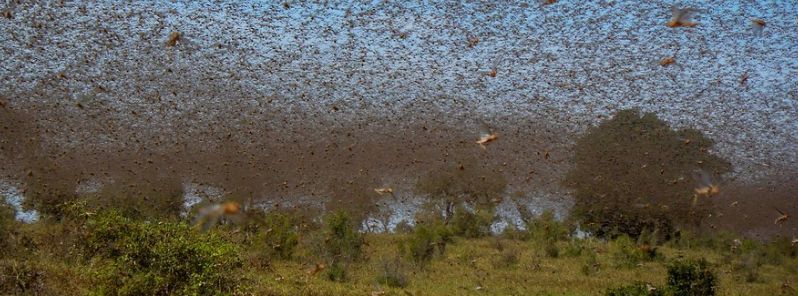Locust outbreak approaches full blown crisis in East Africa

East Africa is reeling from the worst invasion of locusts as the outbreak is nearing a full-blown crisis, sparking alarm among international officials. In attempts to take measures, Somalia has declared a national emergency; Kenya deployed planes spraying pesticides, and the Food and Agriculture Organization (FAO) appealed for urgent support for the Horn of Africa.
According to FAO's desert locust bulletin on February 3, 2020, there is an unprecedented threat to food security and livelihoods in the Horn of Africa, the worst-hit area.
Swarms increased in Ethiopia and Somalia, prompting the latter's government to declare a national emergency. Moreover, it is feared that the situation may not be taken under control prior to the start of harvest in April.
According to the UN, the swarms are largest in Ethiopia and Somalia in 25 years.

Swarms have also started entering the Rift Valley in Ethiopia. Aerial and ground operations were underway but are still inadequate.
Meanwhile, neighboring country Kenya, which is facing the worst locust infestation in 70 years, has started deploying planes over affected areas that spray pesticides.
The ground crews are in "the most woeful terrains," said Marcus Dunn, a pilot and the director at Farmland Aviation.
Five planes are flying over affected areas as authorities try to prevent the locusts from spreading to Uganda and South Sudan.
Kenya's agriculture minister has acknowledged that authorities were not prepared for the range of this year's infestation.


The locusts are "trying to mate and reproduce, so we need more help and because we are racing against time," said Salat Tutana, the chief agriculture officer in Isiolo county.
Tutana called the situation "very sad", particularly for the pastoralists whose livelihoods rely on cattle. If left uncontrolled, locusts can grow 500 times by June.
The FAO has already called for international help especially in combatting the swarms in the Horn of Africa.
In addition, the organization prepared 15.4 million dollars of the 76 million requested for the five countries but expects the necessities will increase amid concerns that the outbreak will spread across other countries such as South Sudan and Uganda.


FAO Director-General QU Dongyu also said that it has mobilized staff and resources to tackle the worsening infestation, and was working tightly with governments and partners in a region where food security was already vulnerable.
Parts of Africa have been hit by severe drought followed by heavy rains brought by strong positive Indian Ocean Dipole (IOD)– these extreme weather conditions are responsible for creating breeding grounds for locusts.
According to a study led by Zhibin Zhang of the Chinese Academy of Sciences, the cycle of locust activity coincided with an increased frequency of droughts followed by severe floods.
Featured image credit: FAO emergencies

Commenting rules and guidelines
We value the thoughts and opinions of our readers and welcome healthy discussions on our website. In order to maintain a respectful and positive community, we ask that all commenters follow these rules.